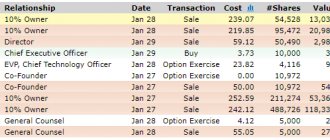Insider information is data from an enterprise (company), which is secret and not subject to dissemination, which is known to a narrow circle of people and can affect the conduct of business, productivity, reputation and other indicators.
Persons with such information are called insiders. These may include:
- management team of the enterprise (know everything about the activities of the legal entity);
- accounting and economic department (have knowledge about the financial issues of the enterprise, accounts, loan and debt obligations);
- depository banks (have knowledge of movements in the accounts of a legal entity);
- organizers of trading platforms;
- third parties who received information randomly.
Anyone who is in any way involved in storing insider data must understand that if information is disseminated, certain problems may arise, and this will also entail liability for the disclosure of insider information.
Concept
Insider information can be defined as information that is not made public, which may affect the company's activities and the value of its assets.
The main characteristics of such information:
- Not publicly available.
- Having this information gives people an advantage.
- The information concerns the internal structure or specifics of the company's activities.
All this turns insider data into value that the company's competitors want to receive.
Second commentary to Art. 185.6 of the Criminal Code of the Russian Federation
1. The article contains two independent elements: illegal use of insider information (Part 1) and its illegal transfer to other persons (Part 2).
2. The subject is insider information - accurate and specific information that has not been disseminated or provided (including information constituting commercial, official, banking secrets, communication secrets (in terms of information about postal money transfers) and other secrets protected by law) , the distribution or provision of which may have a significant impact on the prices of financial instruments, foreign currency and (or) goods (including information relating to one or more issuers of equity securities, one or more management companies of investment funds, mutual investment funds and non-state pension funds funds, one or more business entities classified as insiders by law, or one or more financial instruments, foreign currency and (or) goods) and which relates to information included in the corresponding list of insider information specified in the law.
Unlike the composition provided for in Art. 1853 of the Criminal Code, here we are not talking about falsified, but about real information.
3. The objective side of the first composition is the deliberate use of insider information for carrying out transactions with financial instruments, foreign currency and (or) goods to which such information relates, at one’s own expense or at the expense of a third party, as well as in the deliberate use of insider information by giving recommendations to third parties, obliging or otherwise encouraging them to purchase or sell financial instruments, foreign currency and (or) goods, if such use has caused major damage to citizens, organizations or the state or is associated with generating income or avoiding losses on a large scale.
4. The composition can be material (major damage to citizens, organizations or the state) or formal (the act is associated with generating income or avoiding losses on a large scale, i.e. in an amount exceeding three million seven hundred fifty thousand rubles).
5. The objective side of the second offense includes the intentional use of insider information by unlawfully transferring it to another person, if the act entailed the consequences provided for in Part 1 of the article.
6. The crime is over when major damage has been caused to citizens, organizations or the state.
7. The subjective side of both crimes is expressed in intentional guilt.
8. Subject of Part 1 - any person, including a representative of an insider.
9. Subject Part 2 - special: representative of the insider. Insiders include the following persons:
1) issuers and management companies;
2) economic entities included in the provisions provided for in Art. 23 Federal Law of July 26, 2006 No. 135-FZ “On the Protection of Competition” register and occupying a dominant position in the market for a certain product within the geographical boundaries of the Russian Federation;
3) trade organizers, clearing organizations, as well as depositories and credit organizations that carry out settlements based on the results of transactions made through trade organizers; and etc.
Who can become an insider?
Typically, access to such information is obtained by people associated with it by occupation:
- Company leaders.
- Financial services and accounting.
- Workers involved in information processing.
- Banks.
- Owners of trading platforms.
- News agencies.
- Other people who, for whatever reason, have access to this information.
Having gained access to insider information, every employee of the company must understand the need to keep it from outsiders. Disclosure of such data always causes harm to the organization.
Control over the activities of insiders
Insider activity in Russia is regulated by Federal Law No. 224-FZ of July 27, 2010 “On combating the misuse of insider information...”.
Control over the implementation of the law is entrusted to the Bank of Russia. The auction organizer is also obliged to monitor the legality of the use of information: check questionable or non-standard transactions, request supporting documents and demand written or oral explanations, and report any doubts to the Bank of Russia.
According to the law, insiders in Russia are:
- Issuers, including foreign ones.
- Trade organizers (exchanges) and other organizations (depository, clearing) that are related to transactions carried out on the exchange.
- Professional stock market participants: brokers, banks, management companies.
- Persons who, under a contract, work in higher organizations and have access to insider information: appraisers, analysts, insurers, auditors, accountants, etc.
- Persons who directly or indirectly control at least 25% of votes in the highest management bodies of issuers, trading organizers and professional participants.
The legal entities listed above are required to maintain a list of insiders, regularly inform the Bank of Russia about the inclusion and exclusion of participants from it, and transfer the list to the regulatory body upon request.
Laws of the Russian Federation on insider information
The Law “On Combating the Misuse of Insider Information and Market Manipulation” applies to such data. This document specifies not only the concept of insider information, but also the types of data that relate to such information:
- Trade secret.
- Service information.
- Production data.
- Other restricted information.
The main task of this law is to regulate the use of such information that may affect the operation of the country's financial sector. That is, the key point here is the concept of market manipulation. Actions of this kind include:
- Transfer of insider information to the media.
- Its distribution over unsecured public networks.
- Other ways of disseminating false data that may affect the actions of market participants.
Taking this into account, the law provides for the development of information protection measures.
Insider data cannot be used for:
- Personal enrichment.
- Transfers to people who are not insiders.
- Give recommendations to other people based on this data.
Accordingly, those companies that are recognized as insiders under the laws of the Russian Federation must:
Have a question for a lawyer? Ask now, call and get a free consultation from leading lawyers in your city. We will answer your questions quickly and try to help with your specific case.
Telephone in Moscow and the Moscow region: +7
Phone in St. Petersburg and Leningrad region: +7
Free hotline throughout Russia: 8 (800) 301-39-20
- Publish inside lists on your websites.
- Disclose such information only in accordance with the requirements of Article 8 of Federal Law No. 224.
- Maintain a log of insiders and notify them of inclusion or exclusion from this list.
It is also worth considering that bank employees are also insiders by nature of their activities. These will include:
- Members of the board of directors.
- Bank supervisory authorities.
- Chief accountant and other employees of the financial department.
- Head of a bank branch.
- Other employees who have the opportunity to influence decision making.
In addition to the bank employees themselves, insiders also include their relatives.
Commentary to Art. 185.6 Criminal Code
1. A socially dangerous act is characterized by the unlawful use of insider information.
2. Alternatively, a mandatory feature is the method of committing the crime - by giving recommendations to third parties, obliging or otherwise inducing them to purchase or sell financial instruments, foreign currency and (or) goods.
3. Criminal liability occurs if such use has caused major damage to citizens, organizations or the state or is associated with the extraction of income or the avoidance of losses on a large scale (see notes to this article and to Article 185.3 of the Criminal Code).
4. The subjective side is characterized by an intentional form of guilt. If the unlawful use of insider information is carried out in a manner not provided for in Part 1 of Art. 185.6 of the Criminal Code, then liability will arise if the act is committed for the purpose of carrying out transactions with financial instruments, foreign currency and (or) goods to which such information relates, at one’s own expense or at the expense of a third party.
5. The subject of the crime is a special one - an insider.
6. A qualifying method of committing a crime is its unlawful transfer to another person.
Responsibility for illegal use of insider information
Legal provisions protect such information from disclosure. Therefore, there are several types of liability for such actions.
Administrative liability under Article 15.21 of the Code of Administrative Offenses of the Russian Federation arises as a result of the unlawful use of insider data. Individuals will pay a fine of 3 to 5 thousand rubles for this, and legal entities - from 30 to 50 thousand or will be disqualified for 2 years.
Criminal penalties are imposed for using information for one’s own purposes. In particular, for market manipulation. The fine in this case will be 300 thousand rubles, and if there is major damage from the insider’s actions, he may be imprisoned for 6 years.
Examples of using insider information
The most striking examples of insider transactions in Russia:
- 2003 - insiders of the Yukos and Sibneft companies enriched themselves by inflating stock prices, which grew by 24% 3 weeks before the announcement of the merger of issuers.
- 2004 – The Bank of Russia estimated earnings of insiders at 365–700% per annum based on the use of information about the increase in Russia's credit rating by the analytical agency Standard & Poor's.
- 2011 – a few months before the sale of our cosmetics company “Kalina” to the Anglo-Dutch company Unilever, the shares of the Russian company increased 2.5 times. One of the top managers bought 82% of the securities at the minimum price.
Significant insider scandals in the USA:
- Ivan Boesky ran a company whose main activity was trading using inside information, not just legal information. In 1986, an informant was arrested who supplied Boesky with information about upcoming takeovers of companies. The latter was forced to enter into an agreement with the investigation to avoid a long prison sentence.
- The head of ImClone, Samuel Waksal, learned of the refusal to register a cancer drug developed by his company. Based on this information, he sold his stake. He was found guilty and sentenced to almost 7 years in prison and a $3 million fine.
- Billionaire hedge fund boss Raj Rajaratnam was sentenced to 11 years in prison for insider trading that netted him $45 million.
- The most extensive investigation was carried out against the SAC Group hedge fund Steven Cohen. It took almost 10 years to collect evidence of the misuse of insider information. In 2013, SAC Group admitted guilt and lost the opportunity to continue managing other people's money.
Examples of scandalous transactions based on insider information in Russia
Sale of the Kalina cosmetics concern to the Anglo-Dutch company Unilever (2011)
Interestingly, this fact of using insider information for personal enrichment was proven by the Federal Financial Markets Service after a two-year investigation!
It is only known that a few months before the sale of Kalina, the company’s shares increased in price by 2.5 times: from 1,400 to 4,170 rubles per share. The total amount of the transaction in the interests of insiders amounted to 17.4 billion rubles.
One of the concern's top managers made great money from insider information, buying 82% of the concern's shares at the minimum price before the official announcement of the deal.
Raising Russia's credit rating by Standard & Poor's (2004)
Half an hour before the official announcement of the news, prices for Russian Eurobonds began to rise rapidly.
15 minutes before the publication of the new rating, the price of many shares, as well as the RTS and MICEX indices, jumped by 2%. According to the Bank of Russia, insiders were able to earn 365-700% per annum in half an hour.
Merger of Yukos with Sibneft (2003)
Publication of the news was scheduled for April 22, 2003. But within two weeks, the stock quotes of both companies were steadily growing in price. Although there were no objective reasons for this.
In 19 days, Yukos shares rose in price at MICEX trading by almost 24%. Experts estimated the possible income of insiders at $10 million.
Have you ever heard of insiders? Subscribe to updates and share links to fresh posts with your friends on social networks!
PS By the way, if you are just planning to start working with the stock market, I recommend attending this free webinar by the famous trader and investor Dmitry Mikhnov. A lot of new and useful information is provided for you!
What it is?
Insider information is important proprietary and publicly undisclosed information.
The main “trick”: if AI is made public, it can seriously affect the market value of shares of a particular company. Essentially, this is manipulating the market in one's favor.
Examples of insider information:
- successful merger negotiations
- active acquisition of a controlling stake
- information about serious problems in the company
- list of affiliates
- preparation for a change of management or tender
- financial reporting figures (profit margin, etc.)
Members of the board of directors, major shareholders, organizers of trading on the stock exchange, employees of rating and information agencies, banks and investment funds have access to insider information. Well, and of course, their closest relatives and friends.
Insider information is valuable for both stocks and bonds. Millions are being made from AI!
Let’s say the other day the news comes out that last year the profits of Facebook or Gazprom doubled. I guarantee that within a month after the publication of financial statements, their shares will increase in price.
And if you know about this before the public disclosure, you can buy shares at the “old” price and after some time sell them at the peak of the hype. Putting several hundred (thousands, millions) rubles of profit into your pocket.
This is roughly what happened in 2010, when PepsiCo announced the purchase of 66% of the shares (worth $3.8 billion).
The news was published on December 2. But a couple of days earlier, a group of people bought 400,000 depositary receipts on the New York Stock Exchange. The US Securities and Exchange Commission assessed the illegal profits of insiders. And a more or less accurate figure was $2.7 million!
In a broader sense, insider information is interpreted as something known to a narrow circle of people close to the source.
Let’s say, if only three people still know about a friend’s pregnancy, they have insider information.
In 1934, the Pecora Act was passed in the United States. It finally described in detail the concepts of “insider” and “classified information.” The law explicitly states that trading on AI could bring down the US stock market. Therefore it should be completely prohibited.








